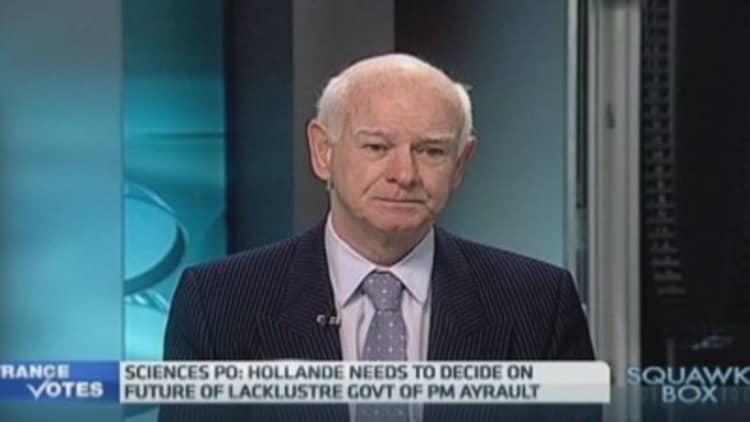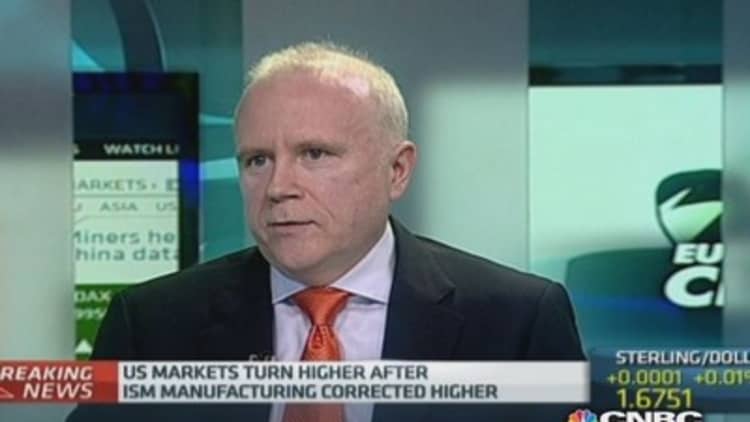A flatlining economy. The weakest profit margins in Europe. Stubbornly high labour costs despite the record unemployment that helped bring the hard-right National Front out on top in last week's EU election.
Why would anyone invest in French companies?
Despite those many reasons not to, however, some strategists have put on their contra-cyclical hats to say now is the time.
These include Societe Generale's head of global asset allocation, Alain Bokobza, whose team in Paris called theCAC-40 index of blue-chip stocks higher in mid-January. Arguing that government policy can, finally, stimulate growth and that labour costs will ease, Bokobza is targeting 7,000 by the end of 2016, up 55 percent from Tuesday's closing index level of 4,504.12.
That target would, in fact, mean a gain of just 13 percent over the pre-crash peak the CAC-40 hit seven years ago - a peak the German DAX has already surpassed by more than 20 percent in a reflection of the many recent troubles of French corporations.
So far, not bad for SocGen's forecast: the bourse index is up 5 percent this year, outpacing Britain's FTSE 100, up 1.4 percent, as well as the DAX, which has risen 4 percent.
Yet opinion is divided. Others have lately made similar forecasts for stocks to rise, but the SocGen call came only two months after Standard and Poor's cut its credit rating on French sovereign debt due to doubts over President Francois Hollande's ability to cut the budget deficit while delivering growth.
Read MoreS&P cuts France's sovereign credit rating
It came as Hollande, now the most unpopular French president in opinion poll history, launched a new plan to do exactly that.
The bet-on-France pitch rests on several assumptions: That Hollande's cost-trimming, tax-easing pledges can boost corporate competitiveness and cut the budget deficit without hurting growth; that the president can overcome parliamentary resistance from fellow Socialists because his lawmakers fear for their seats if they trigger a parliamentary election by blocking them; and that French firms' labour costs are set to fall.
Data declining
Is all that realistic? Despite this year's rise in the CAC-40, there is little to suggest fundamental economic growth is returning to France, that corporate fortunes are improving, or that the nation's finances are on a sounder footing.
The latest growth data showed French GDP was flat in the first quarter and had effectively not grown for nine months.
Total first-quarter revenue of CAC-40 companies was down 2 percent. Data on gross corporate profit margins, based on tax receipts and compiled by the EU statistics office Eurostat, made France the worst performer in the euro zone in 2012, with a margin of just under 30 percent for non-financial companies.

France's own data for the fourth quarter of 2013, the latest available, showed those margins had declined further. The same went for gross return on capital employed before taxes in 2012 - at 12 percent for France according to Eurostat, worse than both Italy and Spain - and well below a euro zone average of 19.
And in a survey by Ernst and Young last week, France lagged Britain and Germany in attracting foreign investment projects - though it did show a pickup.
Government policy is in a tight spot. France keeps missing a euro zone target of 3 percent of GDP for its public deficit. It stood at 4.2 percent of GDP last year and the European Commission expects France to miss the target again next year.
Without growth or potentially growth-killing tax increases, only government spending cuts can bring the deficit down.
Cuts are unpopular - feeding fears the government will dodge the unpopular decisions required to deliver the 50 billion euro ($68 billion) a year government cuts and fund the 30 billion euros of corporate tax relief they promised in January.
Read MoreBuythese French stocks toavoid France's problems
'Hollandenomics'
And yet, more investment strategists are joining the bull camp. In April, UBS published an upbeat note after Hollande drafted in the pro-business Manuel Valls as prime minister.
In the same month, S&P affirmed its November rating and pronounced France's outlook stable. Credit Suisse jumped from underweight France to overweight on May 6. Deutsche Bank is also backing French stocks, though it calls its view "controversial".
SocGen's Bokobza has labelled the reforms "Hollandenomics" and argues that the low ratings of the president and his government will keep rebellious Socialist members of parliament in line up to the next presidential and legislative elections in 2017 - any early dissolution of parliament would likely mean many of them losing their seats, given Hollande's unpopularity.
"The Socialist party has a full majority in parliament and knows there is no viable policy alternative given France's high debt," Bokobza wrote in his latest note last month. "The new policy has the backing of the French employers' association and the approach of the trade unions is constructive."
The advance of anti-EU, anti-austerity parties across the European Union will also mean easier budget deficit targets from a more pro-growth European Commission in future, he predicts - providing France with more growth-promoting wiggle room.

Several brokers also note other reasons to bet on France at the expense of Germany - including that CAC-40 firms are less exposed than those in the DAX to sales in emerging markets, where growth forecasts are being revised downwards.
Labor costs
Then there are labor costs, a longstanding issue in French competitiveness. Here, Bokobza cites the importance of a freeze on civil service pay which is a part of the Hollande reforms.
With the public sector such a major economic force, this amounts to a freeze on France's wages benchmark, he argues.
By contrast, German plans for restrictions on temporary contracts and the introduction of a minimum wage "would be steps in the wrong direction for German competitiveness".
The Credit Suisse team led by Andrew Garthwaite set out similar arguments on labour costs, downgrading Germany along with its French upgrade.
France has already taken steps to reduce the effect on profits and figures published by Germany's federal statistics office suggest these policies - perhaps along with French unemployment running at over 10 percent - are having an impact.
French labor costs grew just 0.4 percent in the third quarter of 2013 from a year earlier, against an EU average of 1.0 percent and a 1.9-percent increase in Germany. Non-wage labour costs actually fell 2.4 percent in France, against a 0.3 percent rise across the EU and a 1.0 percent rise in Germany.
Read MoreThe real problem with France's 75% tax
French unit labor costs nevertheless remain a key concern for rating agencies: "Despite generally weak export performance since the onset of the 2008-2009 global financial crisis, wage increases have outpaced productivity," S&P said in April.
Eurostat put French unit labor costs in Q3 2013 17 percent above 2005 levels while Germany's were ahead by only 10 percent.
Nonetheless, some argue that French stocks offer good value.
Credit Suisse calculates that Paris equities are trading at a 25-percent discount to their 20-year average based on 12-month forward price earnings over normalised return on equity. German stocks sit right on their 20-year average at the moment.
French equities have already outperformed Germany in the year to date, according to Thomson Reuters data that adjusts for the different treatment of dividends in the two indexes.
But the argument for longer-term gains on the back of new economic growth is not yet won. Doubters question whether Paris can persuade Berlin to adopt a slacker, pro-growth deficit policy for the euro zone. And political disputes over targets could be a new blow to investors' confidence in the EU system.
"If those differences persist on how to get growth going in the euro zone," said Alexandre Baradez, chief market analyst at IG, "That would point to renewed tension in the market."
Follow us on Twitter: @CNBCWorld


